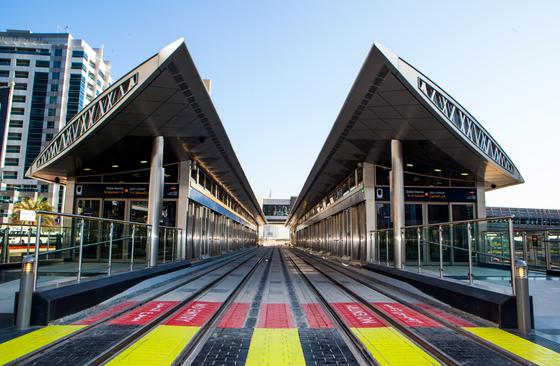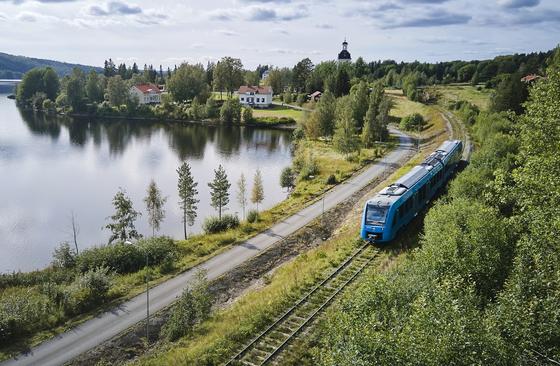
Alstom supports a study jointly conducted by UIC, the University of Birmingham and Roland Berger demonstrating the importance of rail infrastructure financing to achieve global sustainable development goals, ahead of COP28
Alstom supports a study jointly conducted by UIC, the University of Birmingham and Roland Berger demonstrating the importance of rail infrastructure financing to achieve global sustainable development goals, ahead of COP28
Press contact - Coralie Collet
Coralie Collet
Send an emailAMECA VP Communications
Souade Bekhti
Send an email-
Investing in 192,000km of rail infrastructure in low- and lower-middle-income countries could avoid of up to 1.8 Gt of CO2 emissions by 2050, a significant contribution to achieving global sustainability goals
-
This would also bring substantial broader socio-economic benefits to countries
-
Coordinated action from governments, the international finance community and the railway sector can help unlock the required investment
29 November 2023 – On the occasion of the UN’s inaugural World Sustainable Transport Day on 26 November 2023, Alstom, a global leader in sustainable and green mobility solutions, has taken part in a comprehensive study highlighting the potential of rail infrastructure expansion in low-income countries (LICs) and lower middle-income countries (LMICs) for mitigating climate change. Jointly conducted by the International Union of Railways (UIC), the University of Birmingham and Roland Berger, the study provides input for discussions to be held at the 2023 United Nations Climate Change Conference (COP28). It highlights key recommendations as to how governments, international finance institutions, the international community and the railway industry need to work together to invest in rail and decouple economic growth in LICs and LMICs from transport emissions growth.

"This is about making tangible progress in our global environmental goals while shaping the future of mobility.”
The study, titled "Bridging the rail finance gap: challenges and opportunities for low- and lower middle-income countries" underscores the essential role of rail infrastructure in driving sustainable development in these countries. It shows that expanding rail infrastructure by up to 192,000km (180,000km interurban and 12,000km urban) could allow the modal share of rail to quadruple to 8%. This could allow the avoidance of 1.8 gigatonnes of CO2 emissions by 2050, a globally significant contribution to climate action. It would also create formal jobs and deliver benefits in terms of increased accessibility and connectivity, as well as bringing much lower negative external costs in comparison to other modes.
"This study lays out a concrete roadmap for transforming transportation through sustainable rail infrastructure. It clearly demonstrates how targeted investments and strategic planning in rail systems in low-income and lower middle-income countries can lead to substantial CO2 reductions and support sustainable development. This is about making tangible progress in our global environmental goals while shaping the future of mobility” stated Cécile Texier, Vice President CSR and Sustainability, Alstom Group.

Whitepaper: Bridging the rail finance gap - challenges and opportunities for low- and lower middle-income countries
Read more-
192k kmThe study shows that if we expand rail infrastructure by up to 192,000km,
-
8%this could allow the modal share of rail to quadruple to 8%,
-
1.8 Gtand as a result, allow the avoidance of 1.8 gigatonnes of CO2 emissions by 2050.
The study points out the efficiency and sustainability of railways, indeed, it notes that while railways transport 8% of the world’s passengers and 7% of global freight, they account for only 2% of global transport energy demand.
To address the financial challenges in developing sustainable rail infrastructure in LICs and LMICs, the study makes a number of recommendations, including the provision of grants from high-income countries as part of climate finance and the revision of appraisal methods used by international financial institutions to assess rail projects reflecting their long-term benefits. Also, enhanced structuring of rail projects to stimulate broader economic growth through localisation of supply chains. Lastly, strengthening institutional capacity and governance systems for improved technical alignment and technological advancement in rail infrastructure is also suggested.
The study demonstrates the power of transforming rail infrastructure in LICs and LMICs, as evident in Senegal. “Dakar is the first city in Central Africa to be equipped with a regional train, financed by multiples developments institutions, enabling 36 million passengers to travel since 2021, to and from the capital. The additional phase, currently under construction, will further stimulate sustainable economic growth and inclusion, including the creation of 75,000 jobs. The overall project will reduce up to 340,000 tonnes of CO2 over a 40-year lifetime. To boost such investments, there must be a recognition of full spectrum of benefits beyond direct fare revenue.” concluded Andrew DeLeone, President Alstom Africa, Middle East, and Central Asia.
The UN on World Sustainable Transport Day, a wake-up call!
Recognising the important role of safe, affordable, accessible and sustainable transport systems for all in supporting sustainable economic growth, improving the social welfare of people and enhancing international cooperation and trade among countries, the General Assembly decided to declare 26 November as World Sustainable Transport Day. The General Assembly proposes a guide to climate action to help reduce carbon emissions and improve air quality: Transportation | United Nations
Download the full report here.
Alstom™ is a protected trademark of the Alstom Group.

